#;noxiatalks2ya
Explore tagged Tumblr posts
Note
do you have any favorite or standout things in the japanese version of dr2 that doesn't get translated properly/at all into the english version? anything from jokes to speech quirks or differences in characterization. anything at all! i'm just super curious about the differences so i want to give you an opportunity to ramble.
Thank you, anon! I'm sorry this too so long. I've been busy and I had many different things I wanted to share.
I'm sure there's gonna be a lot of stuff I'll miss...I'll just tell you what's on my mind.
Well, firstly, I'd say what I lament most always is how everyone's speech patterns got largely phased out. You see it here and there still with Souda and Owari - occasionally they try to keep the urban accent. Komaeda's filler words got removed, as already discussed. Really, everyone had something unique to them that got removed, and that makes me so sad! Granted, I understand some of it can be quite tricky.
For example, Mioda is a big one. Remember in the NISA translation, she always refers to herself in third person? This is a somewhat clunky translation. Mioda does call herself "Ibuki", but in Japanese, this isn't as weird, and is seen as a sort of cutesy thing. You can pull it off if you're a young/cute woman.
Mioda also calls everyone first name-chan, making her appear childish/quirky.
She also ends her sentences with っす ssu, which is a version of です desu. This makes Mioda, technically, one of the few Danganronpa characters to use keigo speech, although it's so quirky/casual I wonder if it counts...
Souda also uses keigo, but only when talking to Sonia. He calls her Sonia-san, which got translated as "Miss Sonia" (great translation choice btw!) and is the only character he uses honorifics for - well, typically. There is a part in chapter 5 where Souda calls Hinata "Hinata-chan" to tease him, and it's so cute to me xD
By the way, I don't talk about V3 much, but I know there's contention with how they translate Gonta. From what I've seen of V3, the thing that sticks out about Gonta is he, too, uses his first name as his pronoun. I believe the ENG version went with a Tarzan-esque choice of translation, but the joke in the JP version, I believe, was - as said - first person self-pronoun is reserved for young, cute girls...Gonta neither looking like either.
Most of all I lament Hinata's speech...he sounds so similar to Naegi in English, which is a shame, as he was meant to be Naegi's opposite. In Japanese they're night and day, and Hinata really loses that bite he had in the NISA version. It's what makes me sad most :(
On the game itself, there's a joke I think about a lot, that (understandably) loses it's meaning in English. It's in Tanaka's freetime event.


I have no issue with the translation itself. It's sadly just a joke that's lost in English as things are.
It's in the word kotodama. Kotodama refers to the idea that words hold spiritual power. Like a spell, or something. The joke here is Hinata...actually is a kotodama user. Literally.
In JP Danganronpa, truth bullets are called...kotodama. It's a cute little meta joke.
On the flip side, here is a translation I do take issue with:




I understand how they made this error, but it's still a little shocking to me.
First, let's look at context. Context is important in any language, but in Japanese especially. The context is this: Komaeda has a dramatic buildup, talking about how it's time he's gotten a little good luck, that now he can finally say it, and then dramatically pauses after saying Hinata's name...
Let's not be naive. This reads like the buildup to a love confession.
And then, Komaeda just asks, "Can you be my friend?"
It's a wonderful scene. Perfectly captures Komaeda's life in that asking just to be friends requires this much forethought, and it's wonderfully hilarious at the same time. Very Danganronpa, isn't it? Makes you think about the character, gives you some emotion, but also makes you laugh.
I digress. Now that we have context, let's examine Hinata's response.
First he goes, "What?" or え?in Japanese.
Then he says: ああ...なんだ。
"Ah...oh, that's it?" is a fine way to put it here. Literally speaking, the line basically reads: Oh...what? but なんだ is used as a sort of emotional signifier. The words are failing me right now but here are some examples of how なんだ could be translated when used like this:
"What the hell. Okay."
"Jeez, really?"
"That's crazy!" (in response to a story or suchlike)
Does this make sense? It expresses disbelief, shock, surprise, irritation...stuff like that.
So "Oh...that's it?" is good in this context. Clearly, Hinata also expected Komaeda to say something more heavy.
It's the last line that bugs me.
"So that was all just for fun..." is not how I would put it at all. I see how they got that, but I don't know why they didn't realize it sounds super odd. I will break it down.
...そんなことで、よかったのか... ...sonna koto de, yokatta noka...
そんな means "that" or "those", as in "that person" or "those books", etc.
こと means thing, but usually is abstract for an idea. It's a bit hard to explain, but think of it like the English word "it". You say stuff like "it's cool" when someone screws up. "it" represents an abstract idea: referring to the accident a person just made. Instead of repeating that all, you condense the idea down into the word "it". Very similar.
で is a particle that marks "direction" here. All you need to know is that here it's saying "everything that comes before me is what the words after me are referring to".
よかった, literally speaking, is the past form of "good". This is a very flexible word, and we will come back to it.
のか is some sentence ending particles. Again, we will come back to this.
Strictly and literally speaking, the sentence goes:
In response to those words you just said, it was good...
The issue that occurred here is how they read よかったのか. They took よかった to literally be the past tense of good (fun), and のか to be questioning in tone. These are both correct ways to read these individual words, but not in this context I think. It's how we got:
So that was all just for fun...
But I think it's obvious よかった is supposed to be read as it most commonly is in this past-form: an expression of relief/happiness, while のか is supposed to be more monologue-ish.
I emphatically think the line should be read as:
Oh, thank God that was it...
I think it's pretty obvious Hinata is rejoicing that Komaeda, in fact, was not going to suddenly dump something like a love confession on him out of the blue.
Sorry that was a longer one. I don't know how many of you care to hear the in-depth technical talk of how it got mistranslated. Usually I just provide my translation, but I know some people out there probably like the explanations. (I also get a little embarrassed because I often run in circles worrying I'm getting stuff wrong myself....and the fact I'm aware I suck at words. I'm just writing how I read it, and putting it in a way that makes sense to me. I'm always open to discussion if you are a beginner speaker or a native and anything between.)
OK, moving on...I want to talk about Owari's island mode ending. Not because it was translated badly per se, but because it hinges on an element that's impossible to translate. To be fair, the team did their absolute best with it.


Owari never talks about wanting to talk more "girly" outright in the Japanese version. Rather, this is what the line (plus the last as it is part of the sentence) reads literally:
OWARI: So, would it be weird if...I started using a-atashi for myself?
Through the whole game, Owari talks in a very rough manner. She uses オレ(ore) to refer to herself, which is a very masculine pronoun. The Katakana script makes it even more rough. I believe in SDR2, only Souda and Kuzuryuu also use this pronoun/script combo (I can never remember if Monokuma uses オレ or ボク).
However in the Island Mode ending, Owari wonders if it'd be weird if someone like her uses あたし(atashi) for herself. By contrast, "atashi" is at the complete opposite end of the spectrum. It is a very feminine pronoun, and would be a complete 180 from ore.
It is also written in Hiragana, further lending it to be "feminine" and "soft".
So the translation change to her saying she wishes to speak more girly is pretty apt. I dunno if there would be a better way to do this. It's very difficult.
Speaking of Owari and pronouns, her pronoun changes again when she catches the despair disease.

When she has the coward's disease, Owari no longer uses オレ(ore), but instead 私(watashi). This is considered a rather basic/default casual pronoun for women, but it is exceedingly more polite/feminine than what Owari normally uses. Coming from her also, Kanji is a very odd script choice, almost opposite to Katakana.
She also never uses honorifics for people, but while sick, she calls Nidai "Nidai-kun" 弐大君. It's sad this detail, unlike in Island Mode, did not get translated whatsoever.
If I'm on the topic, I might as well talk about some other script changes that weren't translated into English well (or at all).
Remember fake Naegi in Ch.6? Well, I always thought this part was strange:



To me, nothing Naegi is saying warrants Sonia to respond in such a manner. Bryce Papenbrook's delivery of the line doesn't make Naegi yell or anything, either.
But this line makes a whole lot more sense in Japanese.


Fun fact, I'm getting these screenshots from a (mostly silent) let's play by a Japanese channel. The let's player almost never talks, but during the first screenshot, he let's out a questioning "Hm?" and then the second, he chuckles and says, "What's with this sudden sharp turn, man?"
That's because in this scene, Naegi completely changes the way he talks. I've talked about it before, but to reiterate: Naegi talks in a very mild way. He's casual, but he never uses any masculine particles, or employs the imperative form.
However, in the first screenshot, Naegi ends his sentence in ぞ, which is a masculine sentence ender (Hinata uses it). Then in the second one, he uses やろう, which is a very rough/derogatory way to say "you guy(s)".
Anybody who's played DR1 would instantly know something is wrong, since Naegi never speaks like this.
To be honest, it could've easily been translated as making Naegi swear at them, since Naegi doesn't swear a lot - certainly if you had him use "fuck", it would have achieved the same effect.
Next, Twogami's final free time event is full of quirky things that get translated a little poorly.
Firstly, there's this line from Hinata:


While not a mistranslation on a technical level, I feel like it sort of misses a joke here.
Twogami asks Hinata if he likes him (好き). In Japanese, 好き is often used to declare your (romantic) love to someone, or ask someone if they love you. I think then Hinata's answer being "I don't hate you" is him skirting around saying "I like (love) you" to not sound like he's confessing his love, or something.
Then, there's this:


Much like we've seen before, this line makes more sense in the context of Japanese.
Since Twogami is impersonating Togami, he speaks like him, too. And when Togami refers to others (the "you" pronoun, as there are multiple in Japanese), he uses お前(omae). This is very masculine and pretty rude.
However, in this scene, Twogami suddenly calls Hinata キミ(kimi), which is much softer and warmer. Hinata picks up on that, but in English, it comes across a little weird, because what exactly is Hinata picking up on in the English version, then?




HINATA: But you've got to stop using "kimi", it's making me sheepish. And besides...the you I know has always called me by "omae".
Here's a literal translation for you, to illustrate this scene better. I don't know why they cut out the part where Hinata directly tells Twogami to stop calling him キミ because it makes him flustered (very cute by the way), but I feel there was probably a better way to go about this anyhow...
I understand it's a very tricky thing to translate since both キミ and お前 mean "you" in English, but surely there was some better way to word it...
I'd have Twogami talk to Hinata more friendly-like, and have Hinata say "The Togami I know has always been a bit mean to me" - or suchlike.
Moving away from scripts but sticking to Freetime events, here's a mistranslation from one of Saionji's:




There's one big issue in both of these that changes the meaning of the scene entirely. Firstly, 人好し means more than "kind-hearted" - it comes with the impression that the person is easily exploitable for their kindness.
Likewise, 勝手に言って is more than "I don't care" - I think they got that because it literally translates as "say what you want", but it's used as a sort of angry statement. See, it literally translates as "speak as you'd like", but 勝手に is usually used to show that someone will do something in spite of anyone else's wishes. So, really, the phrase means "say whatever you want jerk, I know I can't stop you".
I'd write this scene as:
SAIONJI: You're a really big pushover, mister. Well...I guess that's good for me. HINATA: No one fucking asked.
(I would assume Hinata is doing the equivalent of swearing, as he is using an already antagonistic phrase + imperative form + よ).
Also, if you're wondering...while "say what you want" is a valid English phrase, I feel it doesn't really work here...? Though that's how 勝手に言って translates, the phrase focuses more on the disrespectful aspect of speaking out of turn. I feel "nobody asked" is then more accurate.


This line is also interesting. It's not a mistranslation, but I'm just interested in the Japanese text, because I don't think Hinata's ever replaced ない (nai) with ねー (nee) before? It's a sort of urban accent - Owari, Kuzuryuu, and Souda all have it. It makes you sound rougher.
Like instead of "Jyanai yo" ("that's not it") you say, "jyanee yo" ("Tha's not it") <- I'm unsure how to convey an Urban accent...
"Hell no", then, is actually quite appropriate since it is rougher-sounding (meaner). But it interests me since Hinata's never (?) used this accent before. I guess he was so pissed off he didn't even think about it.
Actually, because of the nature of Saionji's talent and fixation on her home country, her Island mode and FTE is full of references to Japanese culture that doesn't get translated well. It's a tough spot to be in - do you not translate it for the sake of staying accurate to the Japanese culture, and let the Western players stay confused, or do you change it to something more understandable, but lose that nuance? I think it depends case-by-case on what's decided.
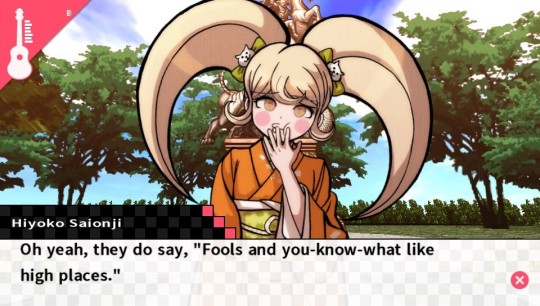
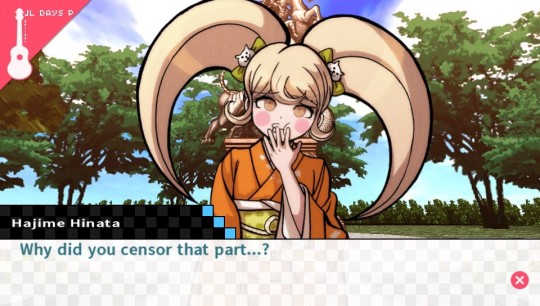
I sadly don't have a screen cap of the JP text, but I do have it from the game's files, so I'll write it down here:
SAIONJI: あー、馬鹿とナントカは高いところが好きって言うもんね。 HINATA: そっちを伏せるのかよ…
This is a Japanese saying, the full saying being 馬鹿と煙は高いところが好き - "Idiots and smoke like high places". It refers to people who foolishly advance "higher and higher" without thoughts of the consequences (when they come crashing down).
This saying though gets often changed to "idiots and so-and-so like high places".
I don't really agree with the English translation because "you-know-what" sounds...sexual? To me, at least. While there is nothing sexual about the original phrase whatsoever. The reason it gets "censored" to ナントカ (nantoka, literally the quotation marker とか with the word "what/something", making it "that 'something'") is unknown to me, but the phrase with ナントカ instead of 煙 is pretty popular especially in spoken Japanese. I think it literally just has to do with the fact that "baka to nantoka" flows out the mouth easier than "baka to kemuri", and isn't because of actual censorship.
Hinata's response then may be to Saionji specifically or in general. Either he's A) asking why Saionji bothers to censor the second part (implying he's never heard the abbreviated version before) or B) he's wondering to himself why people bother to censor the second part in general (implying he is well aware of the abbreviated version).
So, the convo may actually look something like:
SAIONJI: Oh well, as they say: "Idiots and so-and-so like high places!" HINATA: I wonder why that's the part that gets skipped over...
I think this is more plausible. It really has nothing to do with Saionji in particular.
Actually, if you'll recall from earlier in this post with the Komaeda Island Mode ending, we touched on のか, and Hinata is using it again here. Funnily, if we go with my translation, then they ran into the same issue with Komaeda. They read のか in the same erroneous way.
I could be wrong of course...but given the surround culture of the phrase + common sense (I find it hard to believe Hinata would have never heard 馬鹿とナントカ before), this makes more sense I think.
An English version is hard to think of, since this is related to the option "Climb the Statue", so Saionji whipping out that metaphor is a joke in the fact she's calling Hinata an idiot for literally wanting to climb a tall statue.
The closest I can find is a quote form the bible, "Folly is appointed to great heights, but the rich sit in lowly positions". This seems to be somewhat known, but I didn't know of this quote before researching for an English version, so replacing it would make little difference, then...the whole point is the phrase is a common one, but I don't know any common English phrases about idiots in high spots.
...I think this is a good stopping point. There is surely so much more to talk about - more I am forgetting and more that I'll find in the future (and other small things that could not make this post due to image constraints) - but this is what I have right now! I do have more SDR2 translation post I'm working on, but that's it's own beast so it's not something I can really go into here.
Hope any of this was interesting! Thank you!
#hajime hinata#nagito komaeda#gundham tanaka#hiyoko saionji#makoto naegi#akane owari#byakuya twogami#ultimate imposter#sdr2#danganronpa#dr#;noxiatalks2ya#;translationtalk
76 notes
·
View notes
Note
okay, i’ve been obsessing over your komaeda translations and i must know… given the unsure way he talks in the japanese (lots of filler words), does his dialogue change much after he learns the truth? late ch4, i mean. when he starts being condescending to everyone. i’m also very curious about his big speech about wanting to be called the ultimate hope

Hello, anon! Thank you for the message and interesting question! And thank you for the patience!
So, there's three questions here if I'm understanding:
Does Komaeda's speech pattern (sounding softer and using filler words, or generally downplaying his words) change later into ch.4?
When Komaeda starts rambling about hope, does he speak more clearly and more confidently?
What is the nuance in Komaeda's "hope" speech on the laptop?
I will answer all 3 in this order.
(Also, for anybody confused.... here's my post talking about how Komaeda uses filler words, and here's my post talking about how Komaeda's speech was deliberately changed during the earlier beta to make him sound less confident in himself.)
So, question number one:
1. Does Komaeda talk more rudely, use less filler words, or talk more assuredly in ch.4?
Hmm...I don't think so. He still uses honorifics for everyone (-san for girls and -kun for boys), he still uses sa and ne to the same amount, and he does not seem to devote any sort of rude speech for the most part. It is only his words that change, and not the way he speaks them.
My memory is horrifically bad, so please keep that in mind...I asked my friend @kaiokentimesten for help, and was provided with a good number of lines he remembered from ch.4/5 of Komaeda saying rude things, and I looked them up in the Japanese version. All lines were said in his usual speech formations, so there was no change. Again, the words he spoke just happened to be ruder, but they were said in the same tone.
I will show an example.


KOMAEDA: おっと、安易にハムスターを例に出すと、 脱落した彼に怒られちゃうかな? KOMAEDA: Oops. How clumsy of me to use hamsters as an example. Do you think that loser* would've gotten mad at me if he were still here?
*Komaeda does say "dropout" and it's used for people who have been eliminated in a game, or failed a test/exam/otherwise didn't "make the cut". I just think "loser" works better as a translation.
Nothing changes about Komaeda's speech here, he talks the same as he always does. He's just saying meaner words.
(I don't know where the translators got "weakling" from...that's nowhere in the text.)
The only exception I can think of is the beginning of Trial 4. Souda remarks they talk about the murder weapon, and Komaeda three times goes, "Ha?"

It's a funny scene, but significant because, as far as I know, this is the only time Komaeda uses this word.
(I could be wrong, but I'm totally coming up empty right now...please correct me if I am!)
は ha, is very rude. It means "What?" or "Huh?" but is a very rude way to say it. People like Kuzuryuu and Oowada love using it, and Hinata uses it a fair amount, although even Hinata - who's whole design philosophy, as pointed out by the SDR2 artbook, is to be more masculine and ruder than Naegi was - uses え e more often.
え e, うん un, ん nn, あれ are, are more casual but non-rude ways to say "What?"
Komaeda always used one of those first four from what I can remember, or simply 何 nani, which is probably the most neutral way to say "What?"
So to see Komaeda use this is surprising.
This is different than ははは, はっ, or あはは which are normal laughing sounds.
Oh, before we move out of Chapter 4, here's a mistranslation I want to point out (or, less mistranslation, more very direct translation where the joke is lost in English).


KOMAEDA: じゃあ、始めようか。��ンキングターイム...ってヤツだね。
Komaeda isn't a stranger to randomly injecting English words into his speech - a quirk that I feel is used to show he's a bookworm/otherwise intelligent (that's just my thought) - and in those instances, instead of translating directly (because using English in English loses the nuance that using English in Japanese does) I would replace it with bigger, more obscure English words.
But this is actually not one of those times.
Another thing Komaeda is no stranger to is making random pop culture references. He does it more than you would think for a character like him.
While "Thinking Time" isn't a reference to any specific Japanese media per se, it's Japanese game show lingo.
For example, a tough question is given to the contestants, and they have 30 seconds to think of the answer before being forced to give one. These 30 seconds are called "Thinking Time".
I don't know the English equivalent. I know there's a countdown timer in stuff like Jeopardy and Minute to Win It, but I don't think they say anything. Sometimes it's "You have [x] seconds, good luck!" Or "and...start!" or suchlike.
I guess in that case, this line is better localized as:
KOMAEDA: Let's start! You have 30 seconds on the clock...good luck!
(I chose 30 seconds because that's how long the "Make your Selection" part lasts maximum).
2. When ranting about hope, does Komaeda speak more clearly, more confidently?
Yes!
In scenes like post- Chapter 1 trial, where Komaeda monologues to the audience for a few minutes before being knocked out - where he is rambling on and on - his speech is noticeably smoother with less pauses or filler injections. I would also venture to say the way he speaks makes it sound like he is stating facts, that he is very confident in his assertions.
3. Komaeda's Hope Speech on the laptop
Firstly, I want to point somethings out...unrelated to the hope speech itself, but just fun to note.
The garbled, loud noise you hear sometimes where Komaeda is speaking is not gibberish (listen here, volume warning). For whatever reason, the English version did not have Bryce Papenbrook record lines for this, and still uses the Japanese version.
It doesn't reveal any new information, sadly. And I can't make out the second one...but it's highly likely in that line I linked that Komaeda is saying 希望は絶望なんかに負けないんだ or "Hope will never lose to despair."
When it comes to the scrambled text...I've never been much of a decoder, but I can point some stuff out.


For one, I'm 99% sure the Japanese team probably provided the translators with the full, unscrambled text so they could better translate it.
That said, it's not impossible to figure this out.
<まじむかつく+超Yさしい2こんなにEEものg102$うRしs~=~+いdsねうれOrz』
まじむかつく is a term that means "extremely irritated" hence "seriously pissing me off".
The + is the same in both version, I assume it means "and".
The next part needs a little explaining. In Japanese, all consonants (for the most part) are followed by a vowel. on a Japanese keyboard, if you do not finish typing the character, only the consonant shows up.
for example, な is "na". but if you only type the n and don't follow with the a, you get n.
There's a lot of Japanese slang based off this. To type ん you have to type "n" twice. so, a slang form of konnichiwa (こんにちは) is shortened to こん, konn. But it got shortened even further to こn.
so, 超Yさしい requires a bit of guesswork, as there are several sounds that start with "y", like ゆ yu, よ yo, や ya. the さしい at the end tells us it's an adjective.
超 in this case means "very", like "very expensive" or "very awesome".
Likely, Yさしい is やさしい, which is either "kind" or "easy".
This makes 超Yさしい either "extremely kind/nice" or "extremely simply/easy".
Official translators wrote it as "hella nice", aka "very kind".
Beyond that I start to get bad at this xD I don't know where they get "I can't believe something odd like this is only $102".
The 2 may be に, as 2 in Japanese is pronounced に(ni), and に is a particle.
I think the EE Is to be read like いい (ii) in Japanese. And the g might be が (ga)?
超やさしいにこんなにいいものが102$
こんなにいいもの would be "Such nice stuff" or "Really good stuff".
が at the end could be "But..." or "However..." but if the 102$ is connected somehow, then it may be an object particle.
Maybe it's "Really good stuff gotten easy for $102"
But that isn't fully true to the official English version, so maybe they were provided with more clear words to translate from. Like I said, I'm no good at codes.
The last part is easy though. うRし follows the same rule as before. うれし Ur(e)shi(i), which means "happy". I don't know what the "s" is, since it seems the sentence picks back up at いdsね, as うれしい is the full word. "d s" is probably d(e)s(u) with the ne particle at the end. うれしいですね, which means "I'm happy!"
And I'm guessing Orz is the emoticon.
Okay, sorry for rambling. When it comes to the actual speech, there is something interesting to note, albiet small.
The English version is correct in its translation, and the only thing I have to offer is the nuance behind how Komaeda makes his requests.
He says stuff like, "Respect me" "Praise me" "Build a bronze statue of me" and such. And he requests all of these by saying ~てくれ ~tekure.
I don't think Komaeda ever uses this outside of this speech. てくれ can be seen as rather rude. Though the formation looks like an imperative (very rude), it is not, since at it's core, てくれ means you are asking someone to do something for you, not ordering them. It is still the rudest way you can "request" something though.
It's not as severe as Komaeda yelling 黙れよ (damare yo) in 2.5, but it's close behind.
It does show he is being very callous and assertive in this scene, truly a 180 from him being casual but still respectful. This sort of demanding request tone coming from Komaeda is surprising, I feel.
Otherwise...there isn't really any nuance to add, I'm afraid. The speech is rather straight forward and the English version translates it well.
I hope this answers your questions!
91 notes
·
View notes
Note
is komaeda as self deprecating in japanese as he is in english? in his introduction he’s moreso humbly denying hope’s peaks offer than saying he wasn’t worthy. so i was wondering if komaeda comes off as incredibly humble more than self deprecating. or if the translators just really went ham on the self deprecation and got rid of any nuances
Hi! Thank you for the ask and I'm sorry it took so long for me to get to it! I had actually written a reply a few days ago, but Tumblr deleted it...😭 I was too mad to re write it then and there lol. But also, I think I could have been more clear (I wrote it while still recovering from being sick), so I'll try my best this time.
Firstly, if I'm understanding right, you're wondering if Komaeda is NOT self-deprecating, but instead just humble. There's a short answer and a long answer. The short answer is no, he does just blatantly put himself down in the text. The long answer is it may not be as bad as it is at certain parts. So now, I'll explain.
Firstly, let's re-visit the prologue. I've spoken about this specific line more than once.
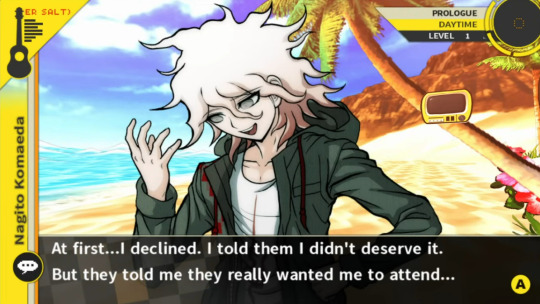
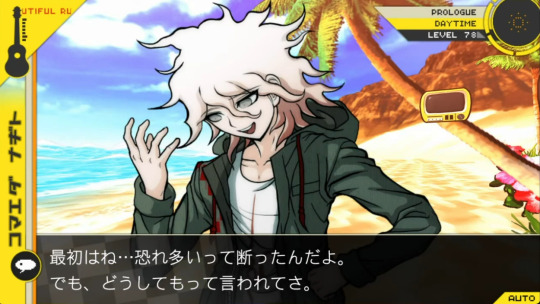
KOMAEDA: Um, honestly, at first...I was humbled, but I refused. But, well, they wouldn't stop insisting on it…
In this scene, yes, Komaeda isn't putting himself down...necessarily. So, the word in question being used here is 恐れ多い. This word seems to give translators trouble. Back before there was an official SDR2 translation, there was a fan-translated version on the SomethingAwful forums by user orenronen.

Generally, I consider orenronen's translation to be more faithful at times. But NISA actually was closer in this case.
恐れ多い literally translates to "extremely scared", but it's really not used in that way. Think of it like any phrase or idiom...."You can't have your cake and eat it too" isn't meant to be literal. It's just a way to say "you can't have both things at the same time".
恐れ多い is a common phrase in Japanese when declining a big offer. For example, your boss gave you the chance for a big promotion, but you declined. You would use 恐れ多い. It can be used to indicate you feel you aren't good enough for the position - this is not a weird thing to say, as being humble is a core part of Japanese culture.
However, at it's core, 恐れ多い just means "I'm very sorry, but no, thanks".
Back to that example. Your boss gives you a chance for big promotion. You would take it, but your boss needs you to move cities for it. You don't want to move. So, you say, "Oh...Thank you so much, but I must humbly decline."
In the past, I explained this phrase kind of poorly and made it sound like it's only used to say you feel you don't deserve the position...what I meant to say was that the word gives the feeling of you not feeling good enough to accept, but that doesn't mean you actually don't feel good enough. Does that make sense? It's like saying "Sorry" as a courtesy when you do something wrong, but maybe you don't actually feel sorry.
In short, this line is ambiguous. The text literally says, 恐れ多いって断ったんだよ, which means (literally) "I refused by saying "No, thanks (humbly)"." Komaeda tells us what he told HPA verbatim, but he doesn't elaborate on why he said that. Did he decline because he did feel undeserving? Maybe he actually was scared to accept, maybe because of his luck? Or did he simply have no interest, and declined without much thought? - It's left to the player to speculate on his reasons.
This is a big part of Komaeda's character, I think. As discussed, he speaks very softly - sounding unsure, or making his statements sound less forceful. The SDR2 artbook itself states that they went back and redid all of his sprite work to make his emotions appear more ambiguous. It's very apparent that not knowing what Komaeda is truly thinking or feeling is a big part of his character. Hinata himself laments about this in many FTEs with him.
I think the writers simply took advantage of the humble culture in Japanese to drive this home. Is he simply humble, or does he really mean what he says?
Now...don't get me wrong: Komaeda does go beyond being humble. He does outright insult himself in a way that is unmistakably not humble.
Take the chapter 1 Trial:
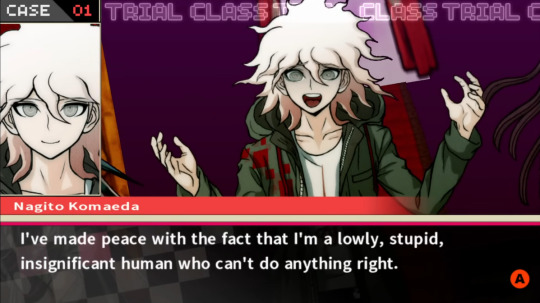

KOMAEDA: ボクは決定的に最低で最悪で愚かで劣悪で、何をやってもダメな人間なんだ。 KOMAEDA: I am, without a doubt, an awful, horrible, ignorant*, inferior, worthless person, and that will never change no matter what I do.
*Komaeda isn't calling himself stupid necessarily. I don't really know how to put it, but it's like...you do stupid things, but you yourself may or may not be intelligent. It's kind of like no matter how smart you get, you will always make dumb mistakes. I hope that makes sense.
This is not being humble. This is very self-deprecating stuff and things nobody would (or should) say about themselves in any sort of casual setting. This is a very shocking turning point because, up until now, Komaeda was just humble. Putting himself down lightly, saying his talent "isn't much" and that he's not as important as the Ultimates sound reasonable, sounds humble. This isn't reasonable or humble, and he says it with very strong assertion, indicated by なんだ and the end.
Also, he never says he's "made peace" with it (which I take to mean he's okay with it?) but that may have been this NISA translators' answer to the なんだ at the end, as it makes Komaeda sound like he's stating a fact. I don't agree simply because I feel like his feelings should be left ambiguous as said earlier...but I understand the mindset.
By the way, before that...the team totally mistranslated a line that had me tilting my head for five minutes trying to figure out how the two connected.
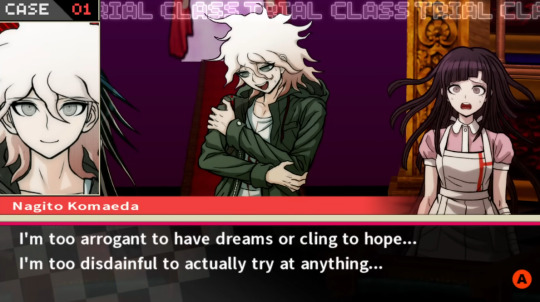
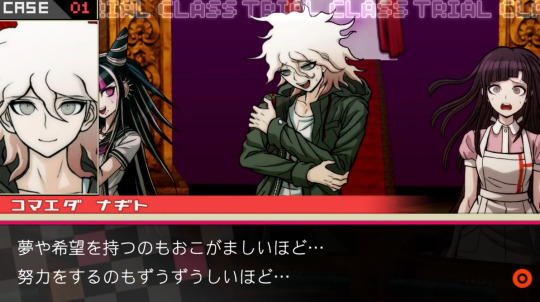
KOMAEDA: 夢や希望を持つのもおこがましいほど・・・努力をするのもずうずうしいほど・・・
I couldn't quite figure out why the NISA translation felt so off to me but the Japanese didn't, and it took me a bit of thought but I figured it out. It's because NISA got the topic of the conversation wrong.
See...Komaeda never says "I'm" in this sentence. It's normal not to say "I'm" in Japanese, though. Topics can be inferred. But then, the next line, where he talks about how he's awful, horrible, etc., he does start with "I am" (ボクは) indicating a change in topic. Meaning the topic of the sentence before it is not about him but about the subject of having dreams and hopes/trying hard.
That might sound confusing, but let me write what this line should look like:
KOMAEDA: It'd be pretentious of me to have hopes and dreams...it'd be audacious of me to try and work hard...
Basically, Komaeda is saying having hopes and dreams is too good for someone like him, and that him working hard to strive for something would be an insult to others.
This definitely makes sense for the next line, where he then says this will never change no matter what he does.
The official English gets it backwards, and now it sounds like he's too...good for these things? To me, at least.
To be fair, because of how it's written, it's easy to make that mistake. But I feel like they should have realized it makes no sense translated that way. Hm...
Anyways, as you can see, Komaeda does say things that are not merely being humble. He truly does have awful opinions of himself, or at least states them in a very pointed, factual manner.
You can argue that his humbleness is an extension of his self-deprecation...or maybe he's just both at the same time. Up to the audience to think.
Lastly, Komaeda often times says ボクなんか or ボクなんて (boku-nanka and boku-nante), which translates literally as "someone like me". It puts yourself down, like, "Someone like me can't be in such a cool club..." or something. This can be humble as much as it can be self-deprecating. It depends on the context of its usage, which I think does hit home with that ambiguous vibe.
I think that's it...I really hope this answered your question! Thank you for the patience!
111 notes
·
View notes
Note
i love komaeda tidbits!!! his valley girl dialect adds so much ahhh... do you recall any particularly funny/notable instances of him speaking like that, or times where other characters comment on it?
I wouldn't go as far as to say it is a valley girl-type accent. 1, because that is just the closest approximate to English (obviously the exact same thing doesn't exist in Japanese) and 2, Komaeda does not use sa and ne nearly enough for it to be those levels...well, in my opinion. I'm sure other people could weigh in on what they think.
Either way he's still stumbling over his words a lot, and I do think that's very charming.
I guess you could make the argument that he does have a valley girl accent by proxy of the fact most other characters don't over-use filler particles as much...like I said in the post, people do it all the time in real life, but in media, characters rarely ever stutter or use filler words (unless it's, like, a super tense situation). So the casual usage, even if it is small, stands out. I guess in that way, you can argue Komaeda has a "noticeable" accent in that regard...but that's very much a topic up for debate.
I'm getting side-tricked, lol.
Anyways, while not related to ne or sa, there is another thing I love that's overlooked, and that's how he uses ってば (tte ba)!
Again, this is a very cute detail. It does not happen often, but I can recall 2 instances where he uses it.
Firstly, let me explain. tte ba in the case I'm talking about is a sentence ender used to express frustration, annoyance, urgency, etc. It can kind of sound like whining, but it's the verbal equivalent of stomping your foot.
What's fun is that this word is predominantly used by women. Men use it too of course, but overwhelmingly it just seems to be a word that girls use.
But Komaeda uses it too!
First instance is in the prologue, where he says it to Hanamura.
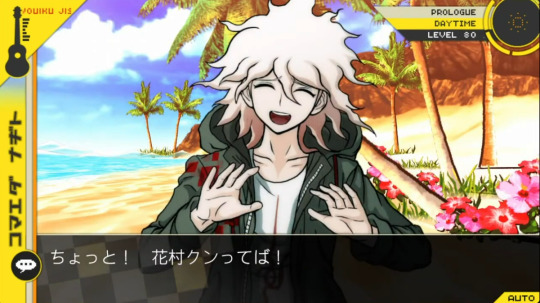
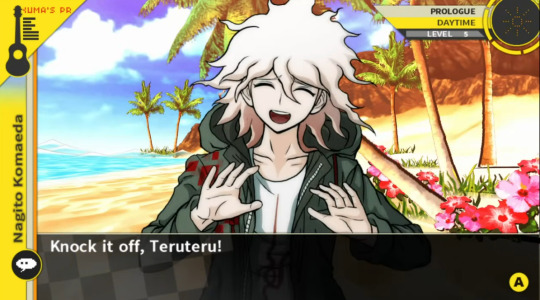
ちょっと!花村クンってば!
The English translation is perfectly fine. But to go more in depth, as you recall, earlier in the prologue Komaeda told Hanamura to stop pestering Sonia with sexual advances. Here, Hanamura does it again. So, naturally, Komaeda responds...
Come on, Hanamura-kun! I told you to quit it already!
The tte ba added at the end makes Komaeda sound like he's scolding Hanamura and is very exasperated.
Also, while the sentence literally is just "Hey, Hanamura-kun!" with an irritated edge, using prior context and knowing what tte ba means (kind of serving to be like "I already told you this!" sort of thing) we can make the sentence sound better in English.
Next is in chapter 2.
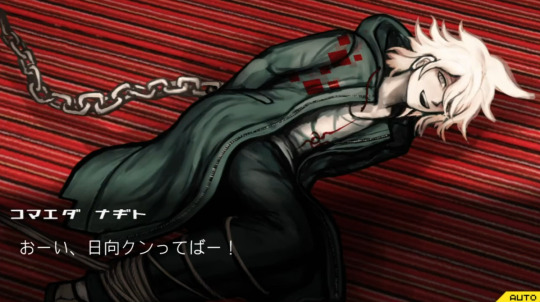
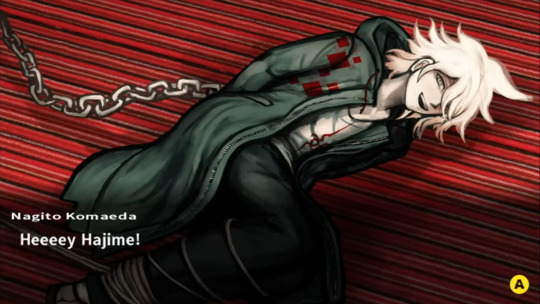
おーい、日向クンってばー!
This one is extra funny, because おーい (usually just おい, oi) is neutral-leaning-male, while as we've said, tte ba is neutral-leaning-female. That's what I love about Komaeda's dialogue: he mixes together "traditionally" male speech patterns and female speech patterns. While, again, not uncommon in real life, anime is so much different. Scripts and word choice are used to tell you about a character's personality. As such, you usually get characters who speak hyper-masculine or hyper-feminine or deliberately ambiguous. I'd say a character who speaks a clean mix of feminine and masculine is very rare. Although, to be more precise, Komaeda speaks masculine and neutral-leaning-feminine...if that makes sense (I will explain later).
Anyways, again, the English translation is good. Komaeda does sound pretty whiny in this scene.
Heeeey! C'mon, Hinata-kuuun!
Now, for the opposite. Something that gets overlooked is an interesting scene in 2.5.
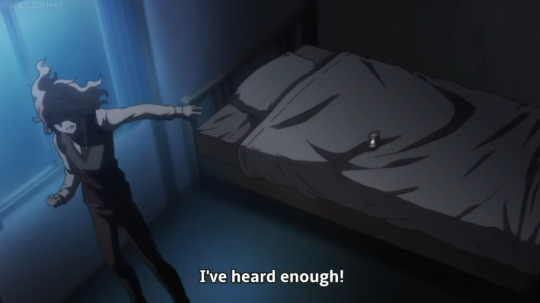
The subtitles has Komaeda as saying "I've heard enough!" but I disagree with this. Komaeda says 黙れよ!in the dub. This is a very masculine turn of phrase because of the imperative nature of it - something Komaeda, to my knowledge, never uses. Very masculine characters do use it often - like Hinata or Oowada or Kuzuryuu - but not Komaeda.
2.5 is complex enough, but this adds a whole new layer to it...Komaeda has never spoke so roughly before. I think it shows just how emotional he truly was in this scene.
I'd translate this line as:
Just shut the fuck up!
And finally...while not canon per se, it is voiced by Megumi Ogata and is very in-character for Komaeda, so I count it. This cute little voice line she recorded for the Danganronpa x Crash Fever on Halloween. It let's me segue into something.
トリック・オア・トリート!お菓子をくれなきゃイタズラしちゃうぞ...なんてね。
Earlier I said Komaeda speaks masculine + neutral-leaning-feminine, and this probably sounds like gibberish to a lot of people because...what does that even mean?
(Keep in mind I'm speaking for the perspective of anime, where these grammar rules carry exaggerated connotations compared to real life! I am also speaking from the perspective of Tokyo dialect aka standard Japanese.)
Komaeda typically uses these particles: sa, ne, yo.
All of these particles are gender-neutral, but ne can be more feminine depending on the context. For example, Saonji uses ne constantly, and so does Mioda. But characters like Hinata and Souda still use ne because again it's context dependent.
There are feminine particles, such as wa, which Komaeda does not use. It is used by characters like Sonia and Celestia and even Kirigiri, which is surprising considering her stoic image (it's very cute).
Then, there's masculine particles, like zo, ze and na. Characters who use zo are Kuzuryuu, Souda, Hinata, and Owari to name a few. Despite Owari being female, she talks very masculine, which adds to her rough image. Ze is also used by all of those characters, as is na.
Komaeda's choice of pronoun is also mild-mannered. Boku is a polite masculine pronoun. It makes sense for him to use it when speaking casually which he is always seen doing. If he used Watashi - also gender neutral (to a point) - while speaking casually, it would make him seem feminine or like a girl.
However, the vast majority of male characters when speaking casually will use Ore, which is a hyper-masculine pronoun. I have lost count of the amount of characters who use this. Only characters I can remember who use Boku (besides Komaeda and Naegi) are Yamada, Hanamura, and Ishimaru.
And for those three, I think it makes sense - they all have this level of acting polite/wanting to be polite or seen as proper.
Which is why the fact Komaeda/Naegi uses it stands out a little bit with the rest of the cast. Makes them appear more mild. opting to use gender-neutral particles only and a mild-mannered male pronoun for your male character tells you a lot about them, especially when almost every other guy in the same series is talking super masculine.
Okay, back to that video. What's cute about it is how Komaeda switches from talking masculine to feminine on purpose.
Trick or Treat! If you don't gimmie some candy...I'mma pull a trick on ya! ...Joking!
I'm unsure how to word this in a way that sounds "masculine" or "feminine" as that doesn't really exist in English I don't think...but the first half of his sentence, Komaeda uses zo at the end to sound threatening/rough, then the last part, nante-ne, sounds feminine when pitched up at the end there. It definitely makes him sound playful.
I also want to point out...though I use masculine/feminine (as what I've talked about are usually employed by men, hence masculine, or women, hence feminine) it is not a matter of being absolute...for example, dresses are seen as being feminine, but that does not mean a man can't wear a dress and still be a man.
Wow, this post got long...I sure do talk. I hope this answers something at least haha. Thank you for the ask!
68 notes
·
View notes
Note
Hi! Are there any translation quirks regarding Nagito’s illnesses in his final FTE? Are there any references to it outside of his FTE?
Hi! Thank you for the ask! And sorry about the wait.
I assume by quirk you mean that if there's any extra info, or if something was translated differently/weirdly.
Regarding his illness in the final FTE, it is the same. Malignant lymphoma stage 3 with concurrent frontotemporal dementia. 6 months to 1 year life expectancy.
As for direct mentions of the illness outside of the FTE, I don't think so. The closest we get, I think, is this official (but non canon) story between him and Nidai during island mode.

I sadly don't have the Japanese version of the book on hand, and it's far more difficult to find manga online in the original language, so we'll have to settle for this and hope the translation is accurate.
Anyways, he outright says it was more from luck than illness, but I don't think that factors out illness. Especially if he was in the hospital almost daily.
If you just mean stuff regarding evidence for his illness, there's a few. Sorta. It's less outright and more like...it can be related, maybe.
Here's an entry from the SDR2 artbook:

Fair-skin. His skin is so pale that it's probably abnormal*. Don't say stuff like "Toast is a good choice for breakfast", he really should eat some white rice too.
*The word "abnormal" here is 病的, which means "sick of body and/or mind". Can be used to describe somebody who has a quality that is ill/abnormal/strange. Such as having an illness, or acting in a way that is excessive to a degree of abnormality. Obviously here it's being used to say he's so pale, he looks ill.
(By the way, if you can speak Japanese, the SDR2 artbook is a lot of fun. We get many great details such as: Komaeda's favorite food is bread/toast, his fashion sense is "edgy" and "avant-garde", his hood is likely custom-made to be a hardhat (this would explain why it doesn't lay flat in his sprites) and he obsessively cleans his bathroom after using it each time.)
Otherwise, on the topic of his FTD, I had a chat with @windcarvedlyre about some interesting tics in Komaeda's speech. I'll reiterate them here in hopefully a more concise manner.
Specifically, one could perhaps argue these to maybe be because of his FTD. For one, he is breathier and generally talks slower than Naegi. I bring this up as they both have the same voice actress, so it's definitely a deliberate choice Ogata made.
He also trails off a lot in speech. However, I have a hard time quantifying this because many characters not just in Danganronpa but Japanese media in general trail off constantly. I can say I think Komaeda is up there as one of the people who does it more often in SDR2, though.
And I think I've talked about this before but he uses a lot of filler words. I actually want to go into detail about this more. I don't know if I have before.
So, in Japanese...a lot of English learners are taught "uh" and "um" words are えーと etto, あの ano, その sono, ええ eeh, and so forth. This is true, for sure. But they aren't the only filler words. I think they're the most well known because JP to ENG dictionaries will readily tell you they mean "um" "err" etc. But others aren't really touched on in ENG dictionaries.
Specifically in Komaeda's case, he has a tendency to use "excessive" ね and さ particles. These particles are normal in Japanese speech, and reflect specific feelings and emphasis. But like any word, you can use them in a manner that functions more like a filler word.
However, context is important, as always.
I kind of see it like this: the way Komaeda uses ね and さ specifically reminds me of both Saionji and Koizumi's speech patterns combined.
Saionji uses ね a lot, probably as much as or more than Komaeda. In her case though, I wouldn't attribute it as a "filler word". To me, it reads more as a deliberate act to be cutesy/playful/youthful, and makes sense with her character.
Koizumi uses さ a lot very similarly like Komaeda. Strangely enough, the official English translation actually does go out of its way to occasionally translate this particle usage as "like" by her (e.g the line "this is like, really important!"), but not when Komaeda uses it.
Anyways, since these are merely being used as filler words, any sort of filler word fits. "Like" "um" "anyways" "so", etc.
You can make of these as you wish.
62 notes
·
View notes
Note
hiii! i wanted to ask about a line of dialogue in chapter 5 of sdr2 -- there's a scene in the dining hall where akane says something like "hey hajime, check it out, i'm already eating!" and it's always just... baffled me?? it's not really part of the scene?? why would she say that and why to hajime???? does that line make more sense pre-translation or am i missing a trope or something because this has been on my mind since i played it. i don't know if that stuck out to anyone else LOL if you have any light to shed >_<
I FORGOT ABOUT THAT LINE...It did indeed stick out to others, as I've seen jokes about it. I sort of forgot though. Here's what it is in Japanese:

Which is still quirky, but makes a lot more sense.
"Yo, Hinata! I beat'cha to breakfast!" (lit: Yo, Hinata...I got to eatin' first!)
The English line isn't exactly incorrect by any means, but the wording is super vague and makes it feel more like Akane is randomly stating what she is doing vs. a playful boast.
In English Hinata responds "As usual, you're eating a lot." but his Japanese line is 相変わらずの食欲だな。Which literally translates as the aforementioned, but it reads (emotionally) like "Of course you beat me here, you're far more of a glutton than I am." but is subtle/indirect. So I'd write it like, "I see some things don't change..."
Now Akane boasting out of nowhere is still rather quirky, but it makes more sense than a flat statement to me.
I hope this clears things up!
46 notes
·
View notes
Note
heyyy.. I’ve been learning Japanese because I’m very interested, I’ve only been using Duolingo so far and I’m not satisfied with it for a number of reasons
anyway do you have any resources you’d recommend for a beginner level in Japanese? I know the entire hiragana alphabet, including sounds like “pu” and “gi” (I can’t figure out the Japanese keyboard yet lmao)
Hi! I'm very flattered you'd come to me! Please keep in mind I do not have a degree in Japanese nor English or any Language Teaching, so this is just advice from a normal guy.
Firstly, it was a good idea to ditch Duolingo. Duolingo is good for learning the JP alphabet, or - and if you don't care/don't want to become fluent - if you just need to learn a handful of phrases to make your Summer trip to Japan survivable. If you wish to become fluent though, it's a really awful tool. For one big reason:
There are no 1:1s in language.
Put simply...there is no "English translation" to any given Japanese word. This is true of any language, I think - not just ENG <--> JP. Sure, some simple nouns can be reliably translated with accuracy - りんご ringo means "apple", or 犬 いぬ inu means "dog". But even then, context matters. There's idioms, sayings - and when you get to verbs, more complex nouns, adjectives...there simply is no 1:1 anymore.
This is why we get translations like Danganronpa which read (70% of the time) like they looked up the word in a JP to ENG dictionary and figured that must be it.
For example... "zetsubou" , "despair", doesn't actually mean despair, really. The way it's used in Japanese is much more common/versatile than how it is used in English. Really think about it. How often in day to day normal conversation do you hear the word despair?
In Japanese, 絶望 ぜつぼう zetsubou is sort of like...misery, negativity, the absence of any feeling of things will be good or okay. This makes it far more common in Japanese natural dialogue.
So please keep that in mind with every word you learn! Learn the feeling, write down as many example sentences you need to help you with it.
This may feel daunting, and it's okay to rely on basic definitions as a beginner if you need to. Everyone starts somewhere. But it's something to keep in mind.
Elsewise, I think toddler cartoons are actually good. Cartoons made for babies and toddlers are designed to help them learn basic things, such as colors, shapes, being nice...etc. Because of the simplistic nature, small words are used, speech is usually slower, and words are repeated consistently. Even just sitting down every hour once a week to watch a toddler show in Japanese is helpful.
The Japanese dub of Bluey and Peppa Pig are very good. Also available (and my personal favorite) is Paboo and Mojies. If you want some material for kids but not toddlers, NHK for School is good.
Watching the Japanese Dub of a show you know like the back of your hand (preferably a kids' show for easier to understand dialogue) is great too, as you can hear how the sentence gets translated into Japanese. The MLP 5 movie is great in Japanese, and I don't know much about Miraculous Ladybug in English, but I caught it on JP Disney Junior a few times and thought it was fun, and I think if you are able to understand some of the toddler shows with relative ease, these would be good places to move to.
Toddler shows are also careful to generally keep the words spoken normal since kids will likely emulate them. It helps keep you from talking like an anime character.
When it comes to reading, little kid books with Hiragana are good, but manga is actually helpful! Manga uses Kanji, but includes Furigana by the Kanji so you can see how to say it. The Yotsubato Manga in Japanese is a good one to start with. You can look up the words you find in a dictionary.
If you need discipline and can't learn without deadlines and such, a language school may be good. While Japanese textbooks can often be misleading for English learners, it's not necessarily incorrect info, and if you need the school environment, then I'd say the pros outweighs the cons.
Also, don't be afraid to use MTL for help, to look up words, and to google in Japanese.
Also for Hiragana and Katakana, this is a good site. I know you already know Hiragana, but just in case.
Watching Japanese vlogs and YT videos are a good way to hear natural Japanese as well. Finding people who know Japanese to talk to is important for practicing your speaking skills as well.
I hope this helps at all!
33 notes
·
View notes
Note
thanks for answering my questions! that was a super interesting read! i feel like in the english it feels like he suddenly got an “im better than you” attitude while in the japanese he’s just talking to them in a way that better reflects how he thinks they should be talked to based on their (for lack of a better term) status in his mind. it makes me wonder if he realizes what hes doing (dementia moment)
i did have another question about his lines specifically when he runs into hinata after the final dead room (the bits where he’s asking if hinata wanted to “become hope”) as i always thought that implied he knew he was kamukura at that point. and i want to know what he’s saying in japanese.
i’m also very curious about that line before the trial where komaeda is wondering why he still cares about hinata! if there’s any nuances there that are left out of the translation
You're welcome! I'm terribly sorry it took so long but I had to recover from being sick and then re-look over Ch.4 again. It was fun!
You bring up a really interesting point about the dementia thing...I wonder, does Komaeda's FTD still affect him in the NWP, does he have flare-ups? I'm unsure...Komaedaologists with better analysis skills than me probably could answer that.
Besides that, let me answer your questions.
So, the part where Komaeda talks to Hinata about admiring hope is interesting for a few reasons...before we even get to the admiring hope part, Komaeda says this:

When supposedly talking about Hinata's lack of talent, but then when he talks about why Hinata is talentless, he says this:

Which is confusing. He's implying Hinata "perhaps" doesn't have a talent because he wasn't determined enough (meaning, he didn't work hard enough) only to then say having a talent/being hope actually has nothing to do with working hard, and it's about how you're born.
When I answer these asks, I watch the ENG and JP version side-by-side, so I caught instantly what the issue was.

This line actually has nothing to do with talking about Hinata being talentless. Keep in mind, the line before this is Hinata saying, "Wh-What the hell...does that mean...?"
Combined with that, it's easy to see this is what the line is supposed to read:
KOMAEDA: Perhaps...you weren't prepared for this to be the answer.
For some reason I'm having a tough time wording it in English right now, so please excuse me. But Komaeda is saying, basically, "Were you not ready for the truth behind this question you've been wondering so long (aka his talent) to be this bleak? Had you not prepared for it to be this undesirable of an outcome?"
He was not commenting on Hinata being unable to get into HPA, he was commenting on his shocked reaction.
Moving on to the part you were actually asking about...


I actually kind of like the ENG translation. It's more liberal but in a good way. I'll provide a more literal translation in this case to better explain.
KOMAEDA: You yearn to posses hope...so you entered Hope's Peak Academy with the plan to devote yourself to that goal, isn't that so?
My only qualm with the official translation is a nitpick; "admire" is not how I would put it...I don't think?
I may be wrong, but in English, "admiring" something doesn't always mean you want to be it. I hear a lot, "I admire his ability to do such hard work" and such. It sounds like you hold a lot of praise for him, but you could never do that yourself. "I admire firefighters, I'd never want to put my life on the line like that" and stuff...
憧れ is better thought of as "aspire", I think. It has the nuance of you want to embody it. "Admire" works, but it's the kind of admiration where you want to be that, too.
Besides that, "Were you willing to sacrifice your body and soul" is a very powerful way to write その身を捧げるつもり, and I really have to give it to the team for this one.
Literally speaking, その身 means "That body", but 身 is an abstract way to refer to a person's self. その then makes it "one's self", and it sounds kind of...grandiose? Serious? I'm unsure how to word it.
Point is, turning その身 into "your [very] body and soul" is a perfect way to put it in this situation. 捧げる has an equal level of importance in feeling, it's like wholly dedicating everything to one thing. Sacrifice is apt.


This translation is also fine, but I wrote my own version too.
Komaeda: Or maybe...you were just a mindless sheep who looked up to Hope's Peak Academy [because everyone else was doing it].
Hinata then interjects, saying, "That's not why I joined at all!" (In the Official translation, he says "I-It's not like that! I...!")
And then Komaeda replies:


KOMAEDA: No, it's because you "wanted to become hope yourself" or something like that. Seriously, quit saying such idiotic things!
Also, I must amend my post here where I said I didn't recall Komaeda ever using ~てくれ outside of his laptop video. In this line, he does use てくれ. I'm sorry >.< my memory truly does suck.
Also, this line after Komaeda explains you either are born with talent or aren't is a mistranslation:


KOMAEDA: That's why...just "aspiring" to be something isn't enough.
I think it's pretty obvious that it's a mistranslation even in English because it reads like a totally unrelated non sequitur. In Japanese, it makes a lot more sense.
Komaeda's ideology can be quite confusing for a first time player, it doesn't help that there's so many mistranslations that make him say basically the opposite of what he means...I wonder why that is.
Only 2 lines later, we get these lines:


Which are, weirdly, way meaner than they are in Japanese.


KOMAEDA: In short...you're nothing more than a Reserve Course student who never had a talent to begin with. KOMAEDA: You just happened to forget. That's all there is to it.
He never calls him a "nobody" - the closest is 予備学科でしかない, where でしかない has a negative connotation to it. So, it's saying "you are merely just a Reserve Course student" with a bit of an edge, but that's it. I guess this could be read as "a nobody from the reserve course" if you interpreted it in the meanest way possible. It's not necessarily wrong; it's up to the reader to decide how "mean" Komaeda intends it to be I suppose. A bit of ambiguity.
I only translate it as more "neutral" as the follow up line does not sound mean to me, so I'm just keeping it consistent...but I would actually love to hear some theories on this. Do you think he's trying to be mean? Or is he just emphasizing Hinata is nothing more than, in a neutral way? Very interesting...
That's all for that part...there's nothing that would allude to Komaeda knowing Hinata is Kamukura based on these lines, I don't think. I'll let everyone theorize though, I'm just here to write translations haha
To your other question, I've actually looked into this before! I only discussed it with a friend privately though, so I never posted it here. Let's fix that.




KOMAEDA: Even so, why...? KOMAEDA: I know that you are an insignificant human being, so why is it that I care about you?
I know nuance is important in lines like these, so let me elaborate more on the Japanese text.
KOMAEDA: 取るに足らない人間だとわかっているのに、どうしてキミの事を気に掛けちゃうのかな?
取るに足らない means something not worth devoting any time to, something so small and trivial, hence insignificant.
どうして is a bit tricky to explain, but it means why/how. You're asking why in the sense of how...which is usually the same as an English "why", I think. In this way, it can be worded also as "so how come I care about you?"
キミの事 is "kimi no koto", and puts emphasis on Hinata's person.
Like, for example, in love confessions, a person will not say I love you (kimi), because it sounds stilted or insincere. You say "you" as kimi no koto, which literally translates as "your thing"...which sounds weird, but all you need to know is that it emphasizes the person's being - their personality, their feelings, their everything. It's a way to make whatever you're saying about this person sound more warm/intimate. Of course it's used for more than just love confessions!! That's just the most popular example. Komaeda uses kimi no koto in his love confession with Hinata in his FTE.
In short, he is just emphasizing Hinata as a person beyond a surface level. This isn't shocking, as this sentence would sound kind of weird if he did not use this turn of phrase.
気に掛けちゃう confuses me for one specific reason and I'll explain that soon. But 気に掛け means "care", specifically this English definition:

being concerned/weighing on one's mind is an integral part to 気に掛け。
The ちゃう attached to it gives the nuance that this is against Komaeda's will, and/or it is something he is doing to his chagrin. Basically, "despite the fact I shouldn't, I care about you [and I can't force myself not to]".
Back to what confuses me. It's how 気に掛け is written. Most commonly, it's written in Hiragana alone as 気にかけ and means the same thing. You can 100% write the second part in Kanji as it is here, but when it comes to written works like this, typically there's a reason for choosing one over the other. Which is to say, the reason it's written in Kanji here as opposed to Hiragana makes me think there's some sort of implied nuance...I could be totally wrong, but it's what my mind goes to.
The issue is, I don't know of any special nuance of using 気に掛け over 気にかけ...so, if this is indeed the case, my theories for why it is written in Kanji, from most likely to least, are:
to emphasize the word's meaning.
to imply a level of sophistication or eloquence to the speech.
to make the sentence easier to read.
If it were written in Hiragana, I think it would be just as easy to read. But it's always a possibility.
I'm very unsure on this last part here...so I'm open to all types of thoughts and theories.
I hope this answers your questions! Thank you again!
46 notes
·
View notes
Note
hihi hihi sooo looks around... ur translation posts have made me wonder more about certain scenes across the game - specifically the ones featuring nagito. i seen the post where it's said that the translators just happened to throw in the word hope for no apparent reason and that really made meeeee curious........ so i was wondering, is this another example of a scene like that? it kinda felt clunky to read whenever i saw it but thought it was just a wording issue but now im wondering if this is a translator just pulling shit out their ass ^_^;;

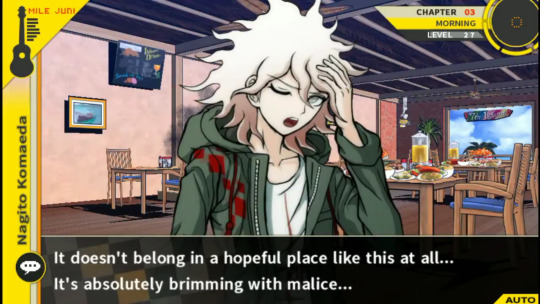
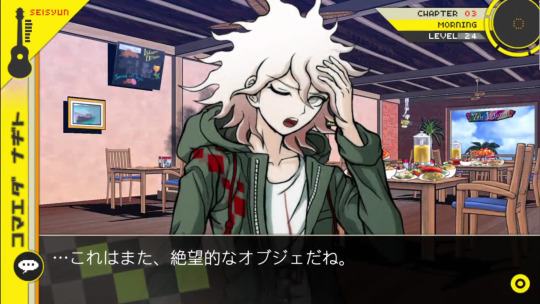
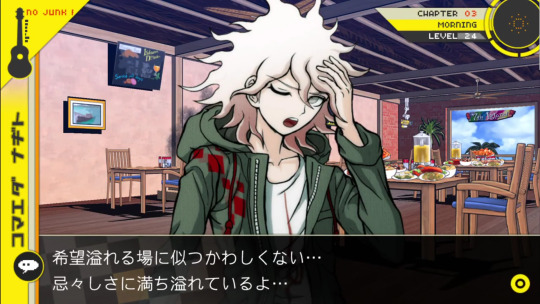
Hi! So, let me write out my own TL and give some notes.
Komaeda: it's also just a very miserable display. It doesn't promote hope at all. It only serves to piss me off.
Calling it a "hopeless object" is a very direct translation. In theory, at least. The word 絶望的 (zetsubou teki) - which literally translates as "despairful" - is defined as meaning "hopeless" in most English dictionaries.
This is kind of why I advise NOT to use Japanese to English dictionaries if you can help it. They're fine if you want a basic translation, and are helpful springboards to get an idea of what a word means esp if you're a beginner in the language, but the fact is, giving one or two English words for a Japanese word rarely encompasses the meaning of said word.
So while Komaeda technically uses hopeless/despairful in his first sentence, the way "zetsubou teki" is used here means something along the lines of "miserable" or just devoid of positivity. It's a "win" point for the Japanese team because it happens to include the word "zetsubou" (despair) in it, and the word despair in Japanese is a lot more flexible than it is in English imo. But keeping it as "despair" or "hopeless" in English just to keep the brownie points of mentioning le funny despair/hope I think is a sort of inaccurate translation, even if it's "literal". I hope that makes sense.
As for "object", he literally DOES say "オブジェ" or "obujee" which of course is a shortened way to say "object". However again this sounds unnatural in English. Komaeda is simply saying "that thing over there sucks". "obujee" also carries the nuance of art pieces (google オブジェ and look at images) so I think changing it to "display" makes more sense than keeping it as "object" to keep the artsy nuance. Commonly English words are borrowed and used in Japanese, but they get transformed to have their own meaning over time and you can't reasonably rely on being like "oh, it's borrowing the word "object" so it must mean the same as the English word object."
Oh, and the reason I had him say "also" is because he's clearly responding to Tanaka in this scene, who says "This is yet an evil attempt to besmirch Koizumi even after death! We will be dragged under with her if we look it dead on!" <- translation from the Japanese text (I don't know what the official English makes him say...)
I don't know why the team didn't catch that Komaeda was adding on with "also". If it's a situation where translators were given specific characters to translate text from and didn't swap notes, I can see how the また would be interpreted as him emphasizing instead of saying "also".
Okay! On to the second bit!
"It doesn't belong in a hopeful place like this at all" this is pretty literal, but not wholly inaccurate. I don't know why but something in my brain is telling me the wording is off. Maybe it's him calling this a "hopeful place". 希望益れる場 means something like "a place that is of use to hope" so it's less that this "place" is hopeful itself but more so that it can be useful to hope...I don't know if that nuance means much to anyone, but I think it matters. Komaeda does talk about how hope is on this "very island" but never once says the island itself is hopeful.
The second part is a mistranslation of sorts. I think the translators mixed up 忌々しい with 忌まわしい because they're pretty similar (and because a lot of English dictionaries/online translation softwares will tell you they are the same). But 忌まわしい is the one that means malice, abhorrent, morally bad etc. 忌々しい (what Komaeda uses) is more subjective and is more akin to "annoying" or "irritating". It's basically going "this personally pisses me off".
Yeah, that's basically it. All in all this is basically the same quality as most of the official translations (sighs), no egregious outright mistranslations mostly but just a lot of fumbles on nuance and wording. Thank you for the ask!
30 notes
·
View notes
Note
hey, so quick question: during the escape room puzzle sequence you do in the final dead room as Komaeda.
One of the puzzles was a play on words (“listen to the NEWS” or something, spelling out the cardinal directions)
Is that puzzle different in Japanese? I’d assume it would be, as that would’ve made no sense to a majority of Japanese players. If so, what does that puzzle say in the original, and what play on words doss it have?
-melody anon
This is a great question!
In English, the riddle is "watch the NEWS", but in Japanese it is this:

NEWSをみろ (NEWS wo miro)
Granted, it's still just as obtuse of a riddle, but it's a bit easier to figure out here I think. For one, having NEWS be in English and the rest of the sentence in Japanese makes it obvious what part you're supposed to focus on a little more than lowercase/uppercase.
The second part is a bit of word play. を (wo) is an object particle marking that you should do [verb] to [object], and みろ (miro) is the verb, which is an imperative form of "to see".
Here's where the wordplay comes in: みろ - and its base form, みる (miru) - can mean a lot of things, and it depends on what Kanji you use to better signify what meaning you want to use.
見る is the most common form, and is used for basically anything visual. See/watch/etc.
観る only means to watch/observe.
診る means to look over like an examination.
etc. These are all みる, and there are other kanji, too.
Basically, since 見る is by far the most common, the game is relying on you to read NEWSをみろ and think it is: NEWSを見ろ, aka "Look at the NEWS/watch the NEWS".
I think though, the riddle is you're supposed to discard your immediate thought and actually think of it as a different みる. In this case, I think it's 視る. This one means to investigate.
So, NEWSを視ろ or "Examine NEWS".
I think in this case, it makes it much more obvious you're supposed to be closely observing the word NEWS, and it is not to be taken literally.
This is just my theory, though. It's what conclusion I came to.
14 notes
·
View notes
Note
What’s the worst cause of a bad translation in danganronpa? I just saw your posts about it and was wondering how it it was
I didn't answer this right away because I spent some time thinking on it.
If you want my honest opinion, I don't think there's necessarily one "worst" translation. To me, it's more of a series of small translation errors / willfully removing character quirks that add up overtime to the bigger picture.
However, there are some specific egregious examples. I highly suggest this article on DR1's translation, as it paints a clear picture for the rest of the series (which abide by similar translation errors/choices).
In said article, however, I think is the worst translation I can think of in Danganronpa off the top of my head.
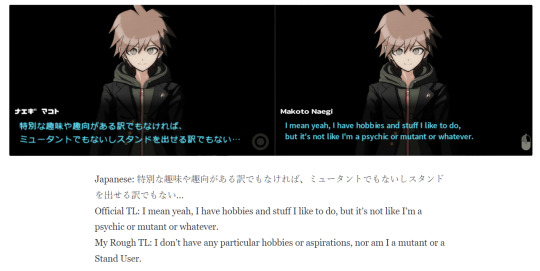
This is pretty bad for several reasons. Firstly, the official TL completely flipped the meaning of Naegi's sentence. I've seen bad translations in Danganronpa, but to completely 180 the meaning of a sentence is pretty bad. Furthermore, I think a joke was lost here. Naegi claims he is not a "Stand User", which is a JoJo reference. This being changed to a generic "I'm not psychic" I think ruins the joke that Naegi, who claims to have no hobbies, is making a reference to a manga - something many consider reading to be a hobby.
Plus, considering this is your first introduction to the character, and this is your foundation for understanding them...yeah. Not good.
SDR2 has a similarly bad introduction for Hinata, though not quite as egregious.
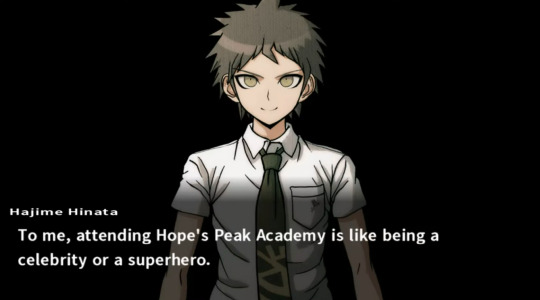
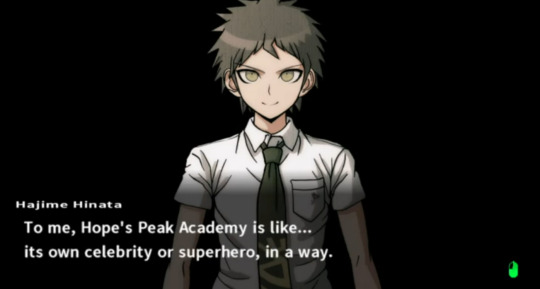
Left is the official translation, right is my fan translation patch.
This is pretty bad considering this is the crux of Hinata's motivations as a character. He does not think the people who attend Hope's Peak are marvelous. He thinks Hope's Peak itself is amazing. That's the whole point of his story, after all. He idolizes Hope's Peak. Never in the game do we see him idolize the students themselves beyond a simple "Wow, you sure are skilled, I can see why you got in". In fact, he routinely is pretty judgemental of them.
There's other things here and there. Komaeda's love confession in his final free time event was botched, as well as Saionji and Koizumi's love confessions in Island Mode.
Mioda's talent was messed up, too. She is not the Ultimate Musician. She is the Ultimate K-On Club Member. This is a pretty Japanese thing, hence the change, but if it were me, I would have gone with "Ultimate Pop Rock Musician" because that's what K-On music basically is, in terms of English genres. This is why the screamo music joke falls flat in my opinion. Of course she likes/plays metal, she's the Ultimate Musician. Except it was supposed to be more shocking since you're told she makes upbeat pop rock music.
Danganronpa also has just...a lot of clunky-sounding dialogue. Maizono's freetime event about the crane is very painful to read, as it is littered with references to Japanese folk lore which is not handled well in English, making it sound very unnatural.
Plus, this line:

was changed. Usually, when given your multiple choice in freetime events, you're supposed to guess what the other character is referring to. Notably, that isn't the case here. You're simply supposed to guess which of these birds are the biggest.
In the Japanese version, Maizono says, "It appears often in Japanese folklore. You know, that bird lives for a thousand years, a tortoise ten thousand years..."
To which Naegi thinks, "She must be talking about..."
Maizono is using a Japanese proverb (a crane lives for a thousand years, a tortoise ten thousand years), which strangely even the wiki seems to miss and mistakenly attributes it to her referencing Urashima Tarō. It's basically her saying "fill in the blanks, you know how this saying goes"...but since that saying is not known among English players, this part is poorly reworked.
Similarly, Twogami's final freetime event was written oddly.

I get what's trying to be achieved here, but it still sounds...not great. The point of the scene is that Togami from DR1 uses "omae" when referring to people, which is a very masculine/rude way to say "you". Twogami drops the act in this sentence and uses "kimi", which is a much softer ways to say "you". Hinata acknowledges this, but since there's only one "you" in English, they tried to word it as best as they could. Personally, I would have just reworded the scene entirely to make Twogami's sentence much softer in general, and then have Hinata comment, "It's weird hearing you speak so politely. The Togami I know is constantly looking down on others."
So, when it comes to the official Danganronpa translation, you're basically contending with 1) a lot of mistranslations, 2) removal of nuances in speech and 3) a lot of clunky, poorly naturalized dialogue. As the article I linked pointed out, even in Japanese, Danganronpa isn't some masterpiece of writing, but undoubtedly a lot is lost from these decisions.
Keep in mind these are just the ones off the top of my head I found worth pointing out in this post. There's probably way worse ones I didn't even think of, since I don't have either the English or Japanese text line for line memorized.
IMO, the best Danganronpa game in terms of text is Another Episode, 100% only because nearly every line in that game is read aloud. I find that trials in Danganronpa typically have marginally less clunky-sounding dialogue in English, and that I believe is entirely due to the fact they have people actually reading this stuff out loud. They can catch if it sounds weird out loud and then change it. So Another Episode, which is basically entirely voice acted, has the most natural-sounding dialogue in the whole series.
V3 I know very little about as I am not a fan of that game...but from what I've seen/heard, it's not much better despite coming out quite some time after SDR2. Gokuhara's speech patterns were entirely rewritten in English to sound like Tarzan...I guess to match his design? If I had to make him speak like any of the existing characters, I'd say he's more in line with Sonia's English translation. Just strange all around.
28 notes
·
View notes
Note
a few days ago someone on tiktok posted about how their favorite twin was kaoru because he was kind and calm and how much they hated hikaru because he was a brat and ive been debating whether to tell you that or not bc i feel like their view of kaoru was so wildly different than yours that it would cause an aneurysm. i love you please dont explode.
HELP LOL thankfully I'm not as insane about it as I used to be once I found out I was having some sort of manic/psychosis episode. That I think also fried my articulation skills. Weird life to lead.
But I still love Ouran so it's okay <3 but yeah, this is so false. But people on TikTok are rarely right about Ouran.
I would NOT call Kaoru kind/calm he is every bit of neurotic that Hikaru is, he just has the willpower to not show it as readily (the carriage. I need not say more.). And his kindness, largely, is something that extends only to the people he likes + is typically a front he puts on.
Kaoru is the twin with more emotional intelligence therefore he is the twin better suited for emotional manipulation .
I'm not saying Kaoru is incapable of genuine kindness, I'm just saying he wields it better as a tool and has done so before to get his way.
Hikaru I guess is a brat but it's only because by contrast he is emotionally immature and doesn't know how to handle or identity his feelings. Kaoru is no better in a lot of ways, but he's at least more self aware.
I think people get this idea that Kaoru is the "nicer" twin because Haruhi monologues about how Kaoru becomes more docile by himself. And I don't think it's because he's "naturally" docile, I think he just knows how to have a bit of social awareness and knows not to outright say/do provocative things.
If Kaoru didn't like / wasn't good at the whole being a prankster/dickhead, then we wouldn't see him do it with Hikaru time and time again to great success and amusement. Simple as really.
13 notes
·
View notes
Note
Hi, I really love your SDR2 translations! I’ve studied Japanese a bit too, but I’m still more of an amateur and don’t have as sharp an intuition for it yet. A while ago, I tried to do this retranslation of Zanka after finding that the sole Zanka translation circulating in the fandom seemed to have some significant flaws. Would you happen to have any thoughts/critiques?
https://www.tumblr.com/doctor-hopper/740448724665401344/%E6%AE%8B%E6%A1%9C-zanka-english-translation
Thanks a lot! I really appreciate the work you do for Komaedology!
Hello! Gosh, this is actually perfect because I translated ZANKA myself for a friend of mine! I never posted it since it was just something I did for fun and didn't think much on. But I can directly compare our translations!
I also want to say I am extremely flattered you'd come to me. I think there's a lot you can teach me, too. Seeing other translators' work lets me evaluate my own. Thank you for the opportunity!
So, I think your translation is very excellent! In fact, you taught me something!
[1] Written with an alternative character for “fall” that appears only here in the song, and that suggests not only falling, but also degrading or going astray.
I kind of glazed over the nuance of 堕ちる vs. 落ちる when writing my own translation, my brain automatically just filling it in as the same as "falling". And while both words do mean to fall, I had failed to think deeply on the change. In a way, I feel new learners have the advantage of always having to think carefully and critically of each word. The more used to it you get, the more you glaze over stuff and don't think about it...I try so very hard to avoid that! But it's super duper hard when you get to the point where you no longer think about nuance consciously, you just "know"...thank you for reminding me!!
Anyways, as you said, 堕ちる has a nuance of "degrading", or something became a "worse" version. Falling from grace, for example.
I wish to comment on the first line of the song.
「明日もまた会えるね」と笑ってた心の徒桜
Your TL: “See you again tomorrow,” I laughed—within my heart, transient cherry blossoms
My TL: “I’ll see you tomorrow, okay?” I smiled. My heart is an ephemeral flower.
I see we both went different directions with 笑ってた. Because of the lack of context, it could either be "smile" or "laugh". I chose smile personally, as I just felt it made more sense with the sentence "I'll see you tomorrow". Both are correct since we have no further context.
As for the second part...I don't think your translation is incorrect by any stretch, but within just simply wasn't what I had first thought of. As you know, の is a possessive, indicating that A "owns" B. Literally speaking, 心の徒桜 is something like "heart of scattering cherry blossoms". I admit my translation of "ephemeral flower" is clunky because I wanted to keep the flower/blossom motif, but 徒桜 is a metaphor for things that don't last long.
In short, thinking of it like that, 心の徒桜 means "[my] heart of little time [left]". I turned "of" into "is" since this makes more sense in English.
All that said, I think the distinction is very small, and your translation works just as well.
温もりを伝えあうように開く桜のように
Your TL: Like the cherry blossoms opening as if to convey warmth
My TL: Like how cherry blossoms bloom like they’re embracing,
Again, your translation is totally correct! I just got a bit more specific with it. 温もり means "warmth", but is often warmth of the "inside", and is very metaphorical/emotional. Hence "embrace" to convey this human type of "warmth".
Now, let's talk about the big line...
平凡に生きて共に逝くこと 叶うのならば 嗚呼…
Your TL: To live an ordinary life, and to die together. If that could come true—alas…
My TL: Ah, If only that wish of mine could come true: To live an ordinary life and pass away together with you.
I read your post here, and it is very well thought out.
However, in Komaeda’s line, there is no explicit “you” preceding it—so he wants to die together with something, but that something isn’t directly said in the sentence. It could be Hinata, but if you’re looking at the line that comes right before this one, it could easily also just be talking about the dying cherry blossoms or the departing spring mentioned there. (It’s worth noting that “together” is only attached to the “dying” part, not the “living an ordinary life” part.)
You are right that there is no "you" - and you are also right that 共に does not need to refer to people. It just means two things occurring jointly. It is used for objects and people alike. I think that sort of ambiguity is intentional.
I, personally, interpreted it as "you" for a few reasons. Back to your post...
An unspecified person who might be Hinata does play an important role in the beginning of the song, when he’s talking about seeing someone again tomorrow. But the line about living an ordinary life and dying “together” does not necessarily lend itself to the interpretation that he is saying he wants to live and die alongside a specific other person.
You are right to say it does not necessarily indicate such, however I think it's a safe bet to assume it does mean that. My reasoning lies in how Japanese in general is structured. If a subject is clear, it does not get repeated. With there already being an aforementioned alluded to "person", I felt this line was a callback. Of course, I can surely be wrong, and I do think there is still ambiguity there on purpose. But I think, at least, the ambiguity only exists because there is a person mentioned in this song. If there wasn't, we could all easily write it off as Komaeda saying he wishes to die with the cherry blossoms.
Another reason I read it as "you" is due to the fact the sakuras could not be the subject of 平凡に生きて共に逝くこと if we are basing it off the sentence that comes before it, ゆく春を惜しみあうように開く桜のように.
Because of this のように at the end, it cannot take the form of a noun. You can still argue it is to die together with sakuras! But it cannot be based on the proceeding sentence, as it does not make grammatical sense. It would then make dying with the sakuras as much of a call back as dying with "you".
(It’s worth noting that “together” is only attached to the “dying” part, not the “living an ordinary life” part.)
This is true! Although, there is a possible invisible キミと in front of 平凡に生きて if Komaeda is indeed singing about this "you".
Making it, "to live an ordinary life with you, to die together (jointly)".
Implied/invisible subjects like this are not uncommon, as you are aware. Omitted 私は and such - I think this line could easily be logically read this way. Your translation isn't wrong - it's just very literal in that it maintains this structure of Japanese ambiguity. Which is good!!! Having multiple translations in different styles is important! I rag on literal translations a lot, but when it comes to a discussion-based format like Tumblr posts (and not an official release to a game), having all avenues open is a great idea. It helps people who can't speak Japanese get the full picture. Your translation provides the raw, ambiguous text - and I'm simply providing one logical interpretation. This then allows people with no Japanese experience to be able to compare and contrast the two, and come to their own conclusions...
So, please don't think I'm saying you're wrong. Translation is tricky, and there's always room for debate on what something could/should be translated as. In the end, you may actually be more "right" than I am. The important thing is you clearly have a good grasp on grammar rules and words.
Now, I have a question for you. I'm confused about a line.
気がつけば枯れゆく枝にひとり残されてた 手折られて朽ちゆく傷が渇きゆくまま
Your TL: Before I knew it, just a single thing remained for that withering branch. Plucked of its flowers and in decay, the wounds keep on thirsting, yearning.
My TL: But before I knew it, a single withered branch had been left behind, alone. It was left broken, rotting, old wounds drying up.
I'm confused on the wording of "a single thing remained for that withering branch"...this is implying there is something undisclosed meant for the branch - something it must receive or see or...you know. Something for it. (ために?)
But I didn't read that at all in the text. Maybe I'm misunderstanding the wording in your translation. Very sorry if I am!
平凡ないのち注げる日まで
Your TL: Until the day this ordinary life receives water
My TL: Until the days of my ordinary life drain away,
As you said in your notes, 注げる means "pour". I really like your interpretation, but I'm unsure if it makes sense. To "receive water" would be to say the life itself is being poured onto, rather it being the thing getting poured, yes? But the issue is there's no "water" in the sentence for it to draw from. You would need 水を注げる somewhere in there. I think English dictionaries are misleading about the meaning of 注ぐ. One of the definitions is "to water", but it only takes this form if water is present in the sentence.

To pour water (etc.) from above. To sprinkle. "I water the bonsai" (lit: "to pour water on bonsai")
Also, my TL is plural since 日 can be day or days. I read it as a plural, but it can be singular just as well. It makes little difference with how it is used here.
Um, I think that's it...I'll post my full song TL under the cut with notes. Thank you SO much for the ask, and please school me if I'm wrong (lol), I hope I don't come across like I know everything, because I don't. I think it's very obvious reading my posts, but my speaking/articulation skills are god awful xD so I know for a fact you'll probably surpass my knowledge in no time. Please keep doing your best!!
“I’ll see you tomorrow, okay?” I smiled. My heart is an ephemeral flower.[1]
The curtain of falling cherry blossoms were like a mist, painting the world like smoke. I was tempted by the sight and ventured further. When I arrived, those petals cast shadows along the water, swaying gently in the wind, falling and causing the water to ripple.
Like how cherry blossoms bloom like they’re embracing,[2] I wonder, where do the petals of a person’s journey[3], which bloom and die in such an ordinary way, end up scattering to?
The hands of the clock stop ticking. My heart, which is in full bloom, begins to scatter petals.[4]
An abrupt gust ends the shower of petals. When I open my eyes, I’m greeted with a sea of petals along the water’s surface drifting away.
Like how cherry blossoms bloom, as if grieving the departing Spring; Ah, If only that wish of mine could come true: To live an ordinary life and pass away together with you.
If the The North Wind and the Sun[5] were to affect us all equally, Then a magnificent flower[6] would bloom after we all braved the storm.
But before I knew it, a single withered branch[7] had been left behind, alone. It was left broken, rotting, old wounds drying up.
For the sake of the cherry blossoms, which bloom as if to fight off the incoming winter, Until the days of my ordinary life drain away, I continue to bloom long after my time has run out.[8]
-
[1] Literally "my heart is scattering cherry blossoms" but the word is also used as a metaphor to mean things that don't last long.
[2] Specifically the word for "warmth" in the sense of human compassion and love.
[3] In the lyrics it is written as "one's (whole) life" but the way it is pronounced is "a person's life circumstances/way of living(lived) life"
[4] Literally "cherry blossom rain". Refers to when the cherry blossom tree begins scattering its petals so much that it's like rain. Considered the most beautiful time to see the cherry blossom trees. This is also when the tree's leaves are dying.
[5] fairy tale. The agreed upon moral is that kind persuasion wins over brutal force.
[6] Written as "flower" but pronounced "hope" in the song.
[7] This uses one of the kanji in Komaeda's name, leading me to believe this is a bit of personification.
[8] Literally "off-season blooming" or a flower that blooms/is blooming when it should be dead already.
15 notes
·
View notes
Note
What do you think about kokichis hat / whole design controversy ? You seem like a dangan expert so i want to know your 2 cents
So, this is going to be a bit of a history lesson.
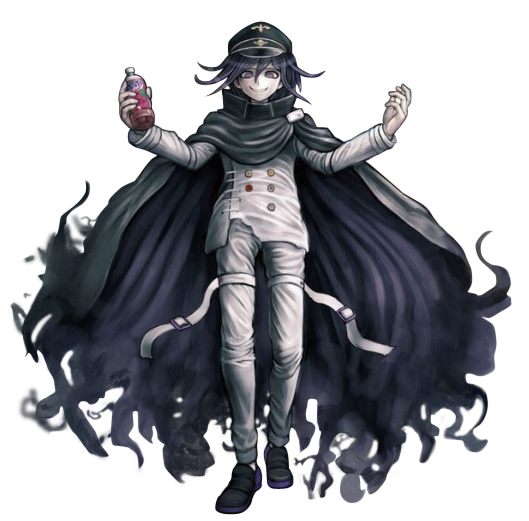
Kokichi is very obviously supposed to be a Nazi reference. That's pretty undeniable. From the SS Officer Visor to the Grape Fanta parody (Fanta having been created by Nazi Germany) it is very much an intentional reference.
This is where culture shock comes into play.
Please note as you read I am not attempting to make a statement on if this is "okay" or "bad" - I am simply presenting the facts of the matter.
As you can imagine, WWII is taught differently depending on where you're from. America, Germany, Italy, Japan, etc. A country will typically focus on its own perspective of events. This not only influences the narrative, but what parts of history are most focused on. For example, in Germany, it is often cited that they focus very heavily on Nazism and Hitler, and reinforce the tragedies they were responsible for. American schools will focus on a more general overview, with a lesson maybe on the atomic bombings they committed (and condemning their actions).
So for Japan, it's obviously different, too.
You can read some personal accounts on threads like this one and this one. But it mostly boils down to this: because a country will mostly focus on their own personal experience when teaching about a historical event, in this case, Nazism is not covered nearly as much in a Japanese curriculum as it would be in an American or German one.
This article from 2015, titled "What is the Nazi Chic Fashion and why is it spreading in Asia?" has a good excerpt, which I'll translate (the article is in Japanese):
しかし、Kidd氏が、欧米のマーケットよりも遥かにナチ・シックが急速に広がっている、と話すアジアのファッション・マーケットでは、ナチのシンボルが繰り返し使われている背景にあるものは異なる。ヒトラーと結び付いた文化的ハードルは低く、かぎ十字を身につけてもショックは本質的に大きくない。
However, according to Kidd, "Nazi Chic" is spreading much, much more rapidly in the Asian fashion market compared to the Western fashion market. However, the context behind the repeated usage of Nazi symbols is different to that of the Western market. The cultural hurdles of wearing something associated with Hitler are much lower, and not intrinsically all that shocking.
This is evident in many pieces of media meant for children or teens. Please think to yourself if you've encountered a piece of Western media made for children or young teens that depicts Nazism or Hitler in a comedic or stylish fashion. Personally, I cannot think of any.
But that is not the same in Japan. For example, the 1995 movie Dragon Ball Z: Fusion Reborn has a scene where the characters Goten and Trunks fight a caricature of Hitler.

Or Ouran High School Host Club, a 2002-2010 manga and 2006 anime, had not just a gag in the anime depicting an all-girl school as Nazis, but a piece of art drawn by the Mangaka herself of the main characters wearing Nazi Chic fashion.


Of course, this is not to say Japan is a-okay with Nazi imagery as a whole. Like any country, citizens have their own views and opinions. There are plenty of Japanese citizens who do not think this type of fashion style is okay. Much like how in America, there are people who think humorous depictions of Hitler are fine. I am just bringing these up to say, from a cultural standpoint, this subject is handled slightly differently.
That takes us back to Kokichi. Kokichi is definitely supposed to be reference to Nazi Germany. But I think it's much clearer now that it's not intended to be malicious. Making jokes or fashion statements out of this is more socially acceptable relative to the west. You still have the right to find it uncomfortable or not okay if it personally bothers you, but I am just explaining why this came to be, why it is not intended to be malicious, and why it was allowed.
I hope you find it informative. :]
32 notes
·
View notes
Note
you should draw hikakyo ooooh you want to so bad (subliminal psychic messaging)

idk why i drew it in animation cell style
anyways idk the concept of hikaru down bad for kyoya but trying to play it off is very funny to me. number 1 tsundere type bullshit like "i made you this shirt by hand NOT BECAUSE I LIKE YOU i hate you. it was kaoru's idea. take it before i change my mind." and kyoya knowingly is just like "ok ." and says nothing else and it drives hikaru insane. can anybody else see this vision please.
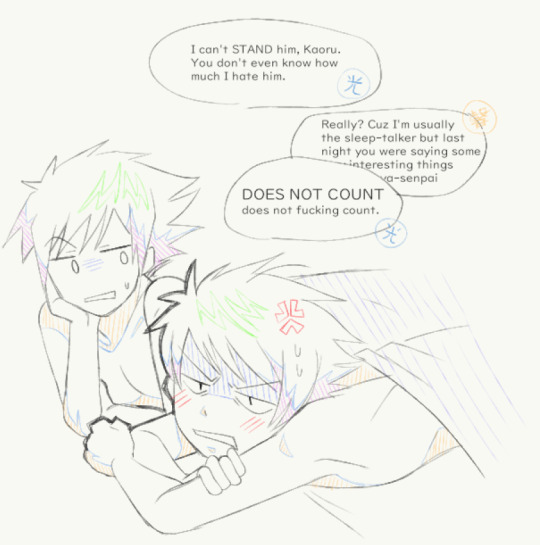
#;noxiatalks2ya#hikakyo#hikaru hitachiin#kyoya ootori#kaoru hitachiin#noxiart#ohshc#ouran highschool host club
153 notes
·
View notes
Note
(og anon suggesting prodigy)
togami.. could you imagine. "my name is togami byakuya. i am the... sigh. i am the prodigy.. affluent progeny."
"..what?"
"call me the prodigy noble. dont make me repeat myself. >:("
might as well have a signoff if im gonna stay for a while
-melody anon
Naegi: The... Prodigy Affluent Prod- um, Prog- Agh! It's like a tongue twister!
Togami: Noble. I am the Prodigy Noble since your feeble mind is unable to even pronounce my real title.
Naegi: O-Okay...Prodigy Noble.
[TOGAMI LATER IN HIS BEDROOM ALONE]
Togami: Prodigy Affluent Progeny. Prodigy Affluent Progeny. Prodigy Affluent Prod- FUCK I ALMOST HAD IT.
11 notes
·
View notes